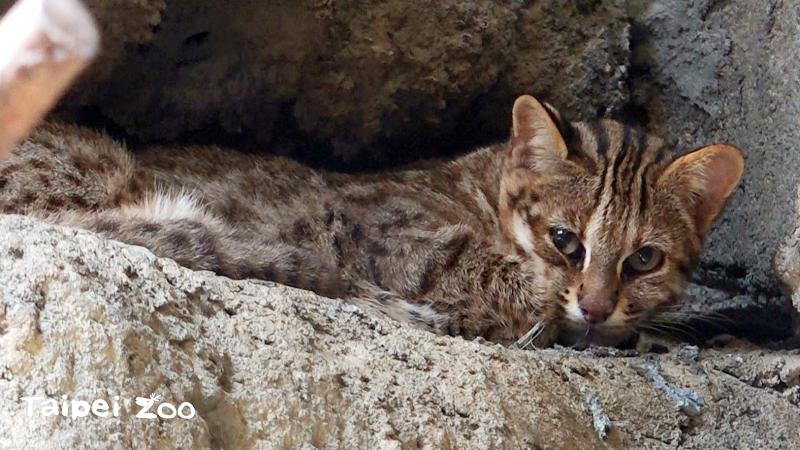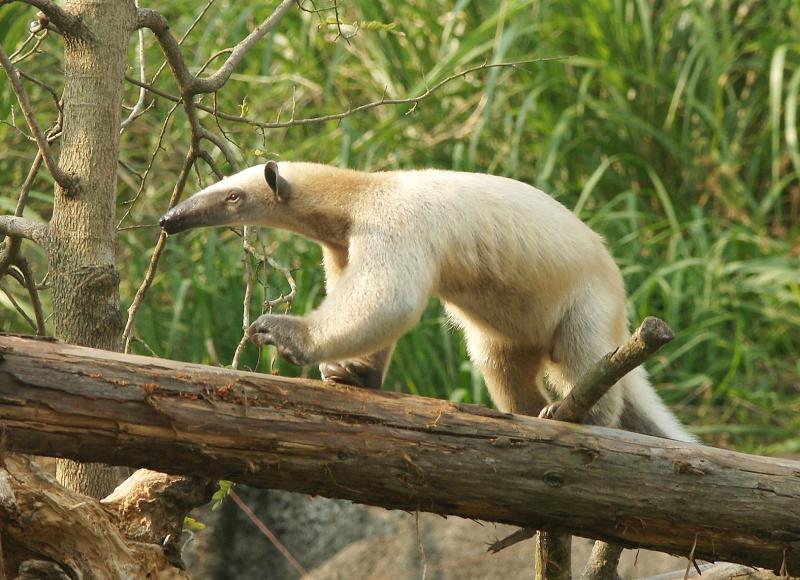A leopard cat at Taipei Zoo named Fei Fei was discovered missing on the morning of Nov. 22 after digging around the artificial rock near the roof netting of the Formosan Animal Area in the zoo’s Outdoor Display areas. Fei Fei apparently took flight through a hole in the netting.
Taipei Zoo spokesperson Tsao Hsien-shao said that during the inspection in the area on the morning of Nov. 22, a zoo employee noticed that a leopard cat was missing. The CCTV footage showed that Fei Fei, a female leopard cat, who was almost four years old and had been sent to the zoo by an animal rescue organization, was digging on the artificial rock wall and had managed to make a hole.
It is thought that the leopard cat might have entered the hole and is hiding behind the rock wall, although it cannot be ruled out that she has escaped from the zoo altogether. Fei Fei is a rescued leopard cat. Her right leg was amputated after she sustained a serious injury.

Photo courtesy of Taipei Zoo 照片:台北市立動物園提供
Zookeepers have made six holes around the artificial rock through which to place food, hoping to encourage the leopard cat to come back through the hole of its own accord. Leopard cats are sensitive creatures, and zoo staff say they will try to keep a distance so that the leopard cat will become less wary, increasing the possibility of it emerging through the hole by itself. Members of the public are advised to maintain a safe distance if they encounter the missing animal and avoid disturbing it, and to notify zoo authorities immediately.
Previously, on Sept. 1, a mother anteater named Little Red and her daughter escaped from the zoo by jumping over fencing. After the zoo sent out a large search party, the baby anteater, named Red Bean, was found; however, no trace of the mother has yet been found. The zoo is calling on the public to keep an eye out for the missing anteater.
Collared anteaters, which are nocturnal animals, usually stay in the zoo building during the day and only take their cubs outside at night. When zookeepers inspected the activity site on the morning of Sept. 1, they discovered that Little Red and her daughter were missing. They immediately checked the CCTV footage and confirmed that earlier that day Little Red, with her cub in tow, had climbed over the electric fence at about 2:30am and escaped.

Photo courtesy of Taipei Zoo 照片:台北市立動物園提供
(Translated by Lin Lee-kai, Taipei Times)
收養在台北市立動物園的一隻石虎「飛飛」,十一月二十二日上午在台灣動物區戶外活動場靠近建物頂網的人造仿岩上方挖掘後,鑽入破洞消失。
北市動物園發言人曹先紹表示,同仁在二十二日上午巡場,發現園區石虎不見,調監視器發現,一隻由救傷體系送到園區的近四歲母石虎,在人工岩壁有挖掘動作,已於岩壁上挖出一個洞,初步研判石虎可能鑽入洞內,藏在岩壁後方,但也不排除逃出園外。石虎「飛飛」是救傷收容個體,右後腳因傷重截肢。
保育員在仿岩周邊打出六個洞口,放置食物,盼吸引石虎自行出洞。動物園指出,考量石虎為高敏感度動物,會減少干擾,讓它放鬆警戒心,增加其出洞之可能性;若民眾發現石虎蹤跡,應保持安全距離,不要驚擾,並立即通報園方。
無獨有偶,動物園內的南美小食蟻獸「小紅」母女在九月一日翻越柵欄脫逃,園方出動大批人力後,順利找到寶寶「紅豆」,但至今仍未觀察到媽媽蹤跡,動物園呼籲民眾協尋。
屬於夜行性動物的小食蟻獸白天多在內舍休息,晚上才會帶著小仔至戶外場活動。保育員九月一日早上巡視活動場時,發現「小紅」母女失蹤,立即調閱監視器影像,確認當天凌晨二時三十分左右,「小紅」帶著小仔翻越設有電牧線的柵欄脫逃。
(中央社)

Even as he grows older, Microsoft founder Bill Gates still fondly remembers the catalytic computer code he wrote 50 years ago that opened up a new frontier in technology. Although the code that Gates printed out on a teletype machine may look crude compared to what’s powering today’s artificial intelligence platforms, it played a critical role in creating Microsoft in April 1975 — a golden anniversary that the Redmond, Washington, company celebrated on April 4. Gates, 69, set the stage for that jubilee with a blog post reminiscing on how he and his old high school friend — the late Paul Allen

Australia’s strict immigration policies have long been criticized, particularly for how they treat people with disabilities. Having been residents of Australia for years, Scottish Laura Currie and her Italian partner, Dante Vendittelli, recently experienced the impact of these immigration policies. Their son Luca, born in Australia and diagnosed with cystic fibrosis, became the reason their residency application was denied due to the anticipated high healthcare costs. Had Luca been healthy, there would have been no objections to their permanent residency. This case not only highlights discrimination against disabled individuals, but also raises questions about fairness and inclusion within Australia’s immigration

A: After holding nine concerts in Kaohsiung and Taipei recently, “God of Songs” Jacky Cheung will stage three extra shows later this week. B: They’re compensation for the three shows he postponed last year due to illness. A: He also canceled three more shows in Guangzhou last month. His health is worrisome. B: When touring Guangzhou, he dedicated his hit “She Is Far Away” to late singer Khalil Fong. That’s so touching. A: Online music platform KKBOX has also launched a campaign to pay tribute to Fong. I can’t believe he died so young: he was only 41. A:

The study had several issues. Small sample sizes made it hard to draw __7__ conclusions. Additionally, taking a __8__ like pure MSG on an empty stomach is likely to make a person ill in any case. Choosing individuals who already had a history of the symptoms could have created a bias because they were likely to __9__ the reactions again. When real scientific research on the effects of MSG was eventually done, many of the myths surrounding it were proven __10__. The U.S. Food and Drug Administration and other global organizations have found MSG safe to eat. Today, MSG